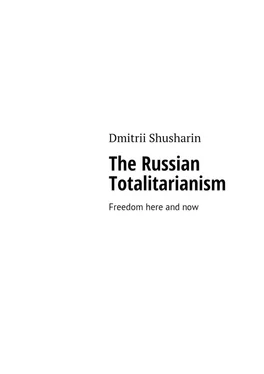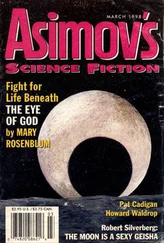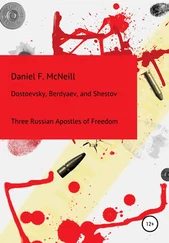Dmitrii Shusharin - The Russian Totalitarianism. Freedom here and now
Здесь есть возможность читать онлайн «Dmitrii Shusharin - The Russian Totalitarianism. Freedom here and now» — ознакомительный отрывок электронной книги совершенно бесплатно, а после прочтения отрывка купить полную версию. В некоторых случаях можно слушать аудио, скачать через торрент в формате fb2 и присутствует краткое содержание. ISBN: , Жанр: russian_contemporary, на английском языке. Описание произведения, (предисловие) а так же отзывы посетителей доступны на портале библиотеки ЛибКат.
- Название:The Russian Totalitarianism. Freedom here and now
- Автор:
- Жанр:
- Год:неизвестен
- ISBN:9785449069030
- Рейтинг книги:4.5 / 5. Голосов: 2
-
Избранное:Добавить в избранное
- Отзывы:
-
Ваша оценка:
- 100
- 1
- 2
- 3
- 4
- 5
The Russian Totalitarianism. Freedom here and now: краткое содержание, описание и аннотация
Предлагаем к чтению аннотацию, описание, краткое содержание или предисловие (зависит от того, что написал сам автор книги «The Russian Totalitarianism. Freedom here and now»). Если вы не нашли необходимую информацию о книге — напишите в комментариях, мы постараемся отыскать её.
The Russian Totalitarianism. Freedom here and now — читать онлайн ознакомительный отрывок
Ниже представлен текст книги, разбитый по страницам. Система сохранения места последней прочитанной страницы, позволяет с удобством читать онлайн бесплатно книгу «The Russian Totalitarianism. Freedom here and now», без необходимости каждый раз заново искать на чём Вы остановились. Поставьте закладку, и сможете в любой момент перейти на страницу, на которой закончили чтение.
Интервал:
Закладка:
But the managers of the discourse are not at all the power, it is the intellectual and media elite that calls the shots, and they won’t accept the grim simplicity that makes the tragedy a tragedy. Again and again, all is drowning in hypocrisy, moving the Russians away from what could be the basis for Russian national renewal.
A thorough systematic conceptual knowledge and meaningful action on the basis of this knowledge is the most dangerous adversary of totalitarianism.
In the meantime, all the actions of those who consider themselves the opposition are based on the knowledge of the former regime of classical totalitarianism, whose experience and mistakes the current regime has learned to take into account.
The regime conceals nothing, there is no cover-ups, on the contrary, it exposes and parades its abomination and obligingly announces: “Topics for resentment are served.” Like a crowd of freeloaders rushes to the buffet table, the progressive community hurries to their computers to amplify the hatred and aggression and prevent the free and dispassionate understanding of what is happening.
The Soviet and post-Soviet mind is characterized by depersonalization of humanitarian achievements of the free world, their dehumanization. It is particularly noticeable in the studies of totalitarianism. The main thing is to identify five or six distinguishing features of this social order. And to make it not too meager, a few quotes is needed. Arendt’s style in The Origins of Totalitarianism is highly aphoristic, her passages read bitingly publicistic, creating beautifully accurate parallels with the present.
The main theme of this first and still the most comprehensive study of totalitarianism is its nature, its inner essence, which is manifested in its relation with the individual human being and the communities of people derived from this individual that let the human creativity to be manifested. The findings made by Arendt are based on the observations of the outcome, but we need to project them on the observation of the process.
In recent decades, Russian scholars have actively translated and abstracted works of some of their Western colleagues. They did it with such eagerness that their work creates an impression that the main occupation of modern Russian thinkers is the interpretation of some individual authors, selected by not entirely clear criteria, translations of their texts and abundant citation; without any attempts to link this knowledge to the here and now. This also applies to the so-called philosophy, and the so-called fundamental sociology. Almost all the institutions created for research in these fields can practically be called not more than translation bureaus and referral services.
The language of the referred research, perhaps, is much more imaginative and metaphorical than the language of thinkers who tried to comprehend totalitarianism. We are dealing not so much with concepts as with images, not with different methods but with different optics, as the luminaries of social knowledge would say (as John Urry has argued about metaphors of sociology). And this is quite suitable for the society dominated by popular culture with its constantly replicated stereotypical images. This is a fragmented society offering a wide variety of fragmented images in which everyone can find something to their own liking. The intellectuals get the images produced by intellectuals. The former social knowledge, that was almost sacred, has lost its value, along with the historical knowledge. Also it has lost its integrity. Paradoxically, the globalization has not spawned the need neither for a global view of the world, nor in generalizing concepts and strategic studies.
However, if you look closely, the description of totalitarianism by less than a couple of dozens of authors, are also fragmented. So, there is a temptation to use any of the fragmentary pictures as a generalizing concept. In Russia this is reflected in the fact that, until the new cult figure comes, they just repeat a certain guru statements, no matter how outdated they are.
Since the beginning of nineties, the Western world had toyed with the simplistic predictions of Francis Fukuyama 6 6 http://www.nietzsche.ru/look/actual/fukuama/
. Dreams, Dreams.
And there was also an interview with John Urry he had given during his visit to Russia in autumn of 2006. 7 7 Shirikov, А. The Evolution of the Global, North West Expert №37 (291). October 9th 2006 (http://expert.ru/northwest/2006/37/urri/)
Borrowed from the language of natural sciences, the words sound convincing: globalization; going beyond the civil society and the nation-state; dissolution of national borders and class distinctions; future abandonment of government as an universal regulator and converting it into a kind of moral authority. His statements are still being quoted. But his predictions never made it beyond wishful thimking. So far, everything is going in the exact opposite direction.
Let’s recall the other projections of John Urry 8 8 Urry, John. Sociology beyond Societies. Mobilities for the twenty-first century. London and New York: Rutledge, 2000. IX, p 255.
. The global citizenship in the global community remains a beautiful dream. The metaphors such as “nomad”, “tramp”, “tourist”, of course refer to different forms of mobility, but why there is no metaphor for “refugee” in the world without borders? It sounds somewhat pathetic to rhapsodize over another brave new world without borders, blood, sweat and tears, brushing aside one serious category of people on the move.
In fact, why millions of refugees are missing in the general picture of the world of mobility?
Apparently, because the picture is too glamorous and narcissistic. These sentiments have come about many times before and, as a rule preceded the global upheavals. Suffice it to recall the Enlightenment, crowned with the invention of the guillotine and mass terror and the ecstasy over technical progress, new culture, new comfort and new mobility, which preceded the First World War.
The picture of universal mobility was brought up for the purpose of psychotherapy, in order to offer the consumer society, which is by nature incapable of reflection, another version of its identity. The refugees’ motivations are fear, survival instinct; a refugee is an evidence of the world’s imperfection and an appeal to compassion. Another thing is the outlook of a tourist in perpetual holiday, motivated only by the desire to have a good time. This world of Universal (extra-, post-) social mobility presents a new utopia, the brave new world that can’t be other than a totalitarian world. Indeed, and not according to Orwell, but rather Huxley 9 9 Auldous Huxley, Brave New World, Saint Petersburg, 1999 (Russian translation)
and Postman 10 10 Postman, Neil . Amusing Ourselves to Death: Public Discourse in the Age of Show Business. NY, 1985.
. The atomization of society leads to its disappearance. The social being is destroyed in the process of constant entertainment and perpetual relocation. The exact social knowledge is not required, the demand even in scientific texts is now for models of different reality, glamorous and utopian. The new utopias became the subject of mass production.
Dreams of citizenship for the animals are beautiful, but hardly consistent against the backdrop of persistent reports of illegal migrants, drowning by the hundreds off the coast of the countries known as the birthplace of European civilization. Providing the coveted citizenship to people of other civilizations and cultures and creating their diasporas in the developed countries does not automatically lead to their integration in the historically formed western societies, which I would call “resident society”, a term I never have come across, so let me be the coiner of it. Obviously, the recognition of the resident society existence contradicts the spirit and meaning of the “sociology beyond society.”
Читать дальшеИнтервал:
Закладка:
Похожие книги на «The Russian Totalitarianism. Freedom here and now»
Представляем Вашему вниманию похожие книги на «The Russian Totalitarianism. Freedom here and now» списком для выбора. Мы отобрали схожую по названию и смыслу литературу в надежде предоставить читателям больше вариантов отыскать новые, интересные, ещё непрочитанные произведения.
Обсуждение, отзывы о книге «The Russian Totalitarianism. Freedom here and now» и просто собственные мнения читателей. Оставьте ваши комментарии, напишите, что Вы думаете о произведении, его смысле или главных героях. Укажите что конкретно понравилось, а что нет, и почему Вы так считаете.












